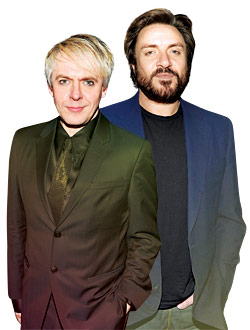
There’s something I want to ask Simon Le Bon and Nick Rhodes, the front man and keyboardist of the (perhaps surprisingly!) still-extant eighties Brit-pop supergroup Duran Duran. But right now, moments after introductions, doesn’t seem like the time. We’re roaming the New Museum on Bowery, where the duo, fiftyish and dapper in bespoke suits disappointingly free of flounces, have come to check out some art by Clunie Reid. The youngish British artist did the cover of their well-received new album, All You Need Is Now.
Reid’s works—inkjet prints on silver foil with strange text scrawled on them—take up a back wall. “I love the fact that she has a problem spelling vaginery,” notes Le Bon of a Reid work with that word, whatever it means, printed on it.
“And what does anussy mean?” asks Rhodes. The fop diplomat to Le Bon’s more freewheeling goofball, he’s petite where his bandmate is burly and bearded, and still wears eyeliner and does his bleached hair in a spiky, mussed style.
“It means pertaining to your anus,” Le Bon says. “That’s a planet, isn’t it?”
We proceed to drinks at the Bowery Hotel. (The band’s other members, John and Roger Taylor, are back in the U.K.; Andy Taylor left the group a few years ago. No, the Taylors are not related.) Le Bon orders a very large Japanese whiskey, Rhodes a glass of red wine, and they start in about the new album. All You Need contains many yummy hooks reminiscent of Duran Duran’s landmark 1982 album, Rio, whose huge hits, like the title track and “Hungry Like the Wolf,” were as sexily glossy as the band’s look.
“Mark [Ronson, the star producer] came to us and said, ‘I want to make the imaginary follow-up to Rio because it’s one of my favorite albums, but I want to make it sound like now,’ ” says Rhodes. One way Ronson recaptured the magic was to use only old analog synths. “They have oscillators inside them,” says Le Bon, “which create a proper sound.”
Along with a lot of child-raising—Le Bon has three kids with model Yasmin, his wife of 25 years; Rhodes has a grown daughter from a previous marriage—the band’s been busy all these years putting out new albums, even doing a brief stint on Broadway in 2007. But they’ve never reclaimed the white-hot appeal they enjoyed in those sequined, shoulder-padded, Reagan-Thatcher years, when they were objects of womanly lust and manly scorn. I finally dare to ask: Did they realize back then that a lot of American guys called them fags?
“Did we give a fuck?” says Le Bon, toasty-fun from the whiskey. “No!”
“I’m not sure it was any worse here,” says Rhodes, meaning the U.S., “than anywhere else.”
“Yes, it was,” says Le Bon.
Certainly Duran Duran’s look was of their own choosing. The band picked their own clothes and did their own makeup, eyeliner and all. “Girlfriends taught us,” Le Bon says.
“I taught my girlfriends,” says Rhodes.
“You were always the different one.”
The conversation turns to their favorite old stage outfits. “We had a knife!” Le Bon booms. “We cut off the tops of our T-shirts, the arms, we rolled the sleeves of our jackets up, we tucked the trousers into our boots. And next week they were doing it on Miami Vice. So we knew we had an impact.”
Then there were the headbands, accessories out of a tutti-frutti safari, one of which figured prominently in Rhodes’s favorite outfit. “It was a gray-and-black leopard print—wait, no, not leopard.”
“Taaagah strahps?” Le Bon, now appearing fully drunk, asks in a strange southern accent. “Snakeskeen?” (Now a cockney accent.) “Cracadaahl?”
What new music do they like? The (very truly gay) Scissor Sisters, they both say, and the Killers, whose lead singer, Brandon Flowers, has been a feathers-and-mascara dandy himself—as have Fall Out Boy’s Pete Wentz and Jared Leto in 30 Seconds to Mars.
“We’ve been accused of creating metrosexuality,” says Rhodes, now texting friends to try to make dinner plans. “If that’s what you think, then fine. We’re not that different from a lot of English guys who are perhaps a little more … flexible about the way they are.”
“What you’re seeing now,” says Le Bon, quite grand through his drink, “is a result of people like us who pioneered it in the face of adversity.”
Have good intel? Send tips to intel@nymag.com.